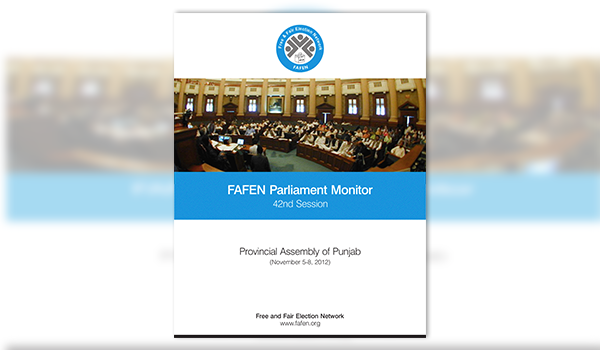 The brief 42nd session of the Punjab Assembly that passed six pieces of legislation was marked by the disinterest of MPAs in sessions’ proceedings. The session witnessed low attendance of members in each of the four sittings and persistent lack of quorum. On average, only 36 out of 371 members were present at the beginning of each sitting while 55 at the end.
The brief 42nd session of the Punjab Assembly that passed six pieces of legislation was marked by the disinterest of MPAs in sessions’ proceedings. The session witnessed low attendance of members in each of the four sittings and persistent lack of quorum. On average, only 36 out of 371 members were present at the beginning of each sitting while 55 at the end.
The session, which met between November 5th and 8th, lasted 12 hours and 20 minutes with each sitting lasting, on average, three hours and five minutes. Each sitting was delayed on average by 113 minutes.
The Punjab Assembly is the largest legislature in the country with a membership of 371. Despite their responsibility to represent such a vast number of people, the attendance of members especially at the beginning and the end of each sitting remained significantly lower than the minimum required one fourth (93) of the total strength (371) for passing bills. The lack of quorum was pointed out on four occasions, while at many other occasions the lack of quorum went unnoticed.
The presence of the Speaker, Deputy Speaker, Chief Minister, the Leader of the Opposition and the parliamentary leaders in the house highlights their interest in the proceedings. The Chief Minister did not attend the session while the Leader of the Opposition attended one sitting for 20 minutes. The Speaker chaired all but one sitting, which was presided over by the Deputy Speaker. The MMAP parliamentary leader attended three sittings while the PML and PMLF party heads attended present in one sitting each.
The parliamentary head of PMLZ did not attend the session. While the attendance of members remained low, the assembly managed to pass six bills – four new pieces of legislation and two amendments to existing laws.
None of the seven resolutions appearing on the orders of the day were taken up by the house.
In the legislature’s oversight over the government, which is mainly carried out through putting questions, a total of 112 starred questions (requiring oral reply) – 45 by women and 67 by men members – were asked during the session, with the most directed to the Punjab Ministries of food, health, livestock and diary development, youth affairs, sports, archaeology and tourism departments. Women legislators were observed to be more proactive in holding the executive accountable to the legislature with each woman MPA, on average, asking 0.5 questions1. No unstarred questions (requiring written reply) were raised during the session.
Calling attention notices are also a tool of oversight of executive through which the attention of a minister is drawn towards a matter of urgent public importance. Through this notice, a member can request a minister to pay attention to a particular matter and take necessary steps to address it. Two law and order issues were raised through these CANs – members called the attention of the house towards murders cases in district Kasur and Lahore.
Among other agenda items, a total of eight adjournment motions were raised and taken up during the session. The house took up adjournment motions regarding conveyance allowances for provincial government employees, water shortage, theft of fuel, restoration of heritage sites, education, provincial budget and construction of prisons.
Speeches by members and treasury rejoinders on points of order took 13% of the total session time, dipping into the time otherwise allocated for agenda items on the order of the day. Unless the speaker gives a formal ruling on a point of order, speeches and rejoinders do not contribute to any assembly output and only provide media with news pegs.
The house witnessed two walkouts during the 4th sitting. A PML female MPA walked out of the house protesting against the non-parliamentary behavior demonstrated by law minister. On another instance PML and PPPP legislators protested against the inclusion of bills on agenda at the eleventh hour.
For complete report click here








